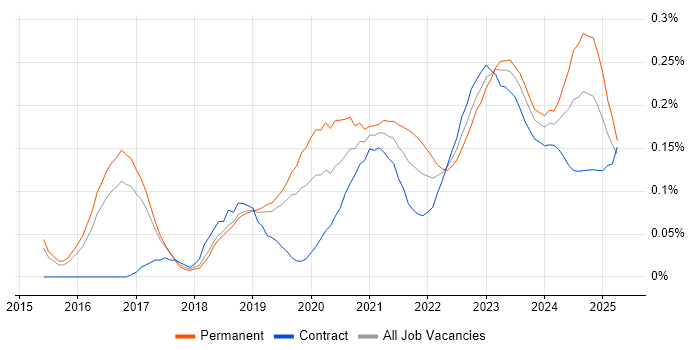Cybersecurity Engineer
UK > Work from Home
The median Cybersecurity Engineer salary for remote or hybrid work is £55,000 per year, according to job vacancies posted during the 6 months leading to 2 May 2025.
The table below provides salary benchmarking and summary statistics, comparing them to the same period in the previous two years.
|
|
6 months to
2 May 2025 |
Same period 2024 |
Same period 2023 |
| Rank |
377 |
544 |
561 |
| Rank change year-on-year |
+167 |
+17 |
+196 |
| Permanent jobs requiring a Cybersecurity Engineer |
36 |
45 |
110 |
| As % of all permanent jobs with a WFH option |
0.24% |
0.13% |
0.26% |
| As % of the Job Titles category |
0.27% |
0.14% |
0.27% |
| Number of salaries quoted |
32 |
38 |
101 |
| 10th Percentile |
- |
£40,650 |
£41,250 |
| 25th Percentile |
£37,716 |
£47,500 |
£46,250 |
| Median annual salary (50th Percentile) |
£55,000 |
£64,925 |
£60,000 |
| Median % change year-on-year |
-15.29% |
+8.21% |
-29.41% |
| 75th Percentile |
£66,250 |
£73,419 |
£71,250 |
| 90th Percentile |
£86,125 |
£77,000 |
£93,750 |
| UK median annual salary |
£55,000 |
£65,000 |
£60,000 |
| % change year-on-year |
-15.38% |
+8.33% |
-20.00% |
For comparison with the information above, the following table provides summary statistics for all permanent IT job vacancies with WFH or hybrid options. Most job vacancies include a discernible job title that can be normalized. As such, the figures in the second row provide an indication of the number of permanent jobs in our overall sample.
| Permanent vacancies in Work from Home with a recognized job title |
13,568 |
32,486 |
41,019 |
| % of permanent jobs with a recognized job title |
90.66% |
95.98% |
96.07% |
| Number of salaries quoted |
9,888 |
24,950 |
29,138 |
| 10th Percentile |
£30,000 |
£33,116 |
£36,500 |
| 25th Percentile |
£43,750 |
£42,500 |
£47,250 |
| Median annual salary (50th Percentile) |
£60,000 |
£56,451 |
£62,500 |
| Median % change year-on-year |
+6.29% |
-9.68% |
+4.17% |
| 75th Percentile |
£77,500 |
£75,000 |
£81,250 |
| 90th Percentile |
£100,000 |
£92,500 |
£100,000 |
| UK median annual salary |
£57,500 |
£52,900 |
£60,000 |
| % change year-on-year |
+8.70% |
-11.83% |
- |

